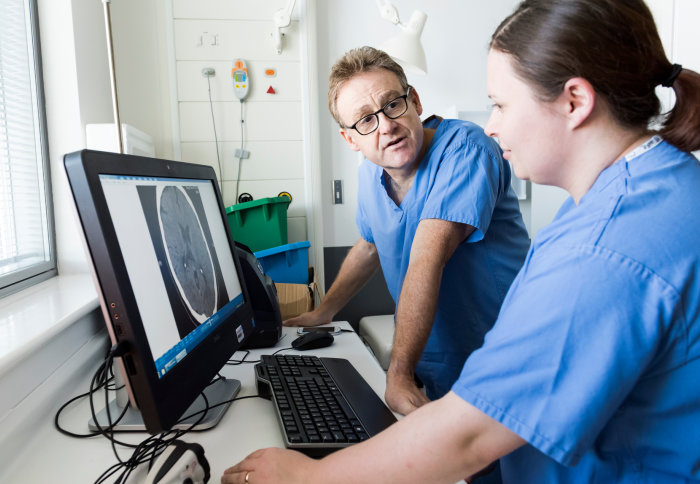Healthcare staff awarded fellowships to research better patient care
by Maxine Myers

Five healthcare professionals have been awarded prestigious research fellowships for projects which could improve the delivery of patient care.
Working in the fields of nursing, pharmacy, occupational therapy and dietetics, the five will conduct research over the next two years as part of the NIHR Pre-doctoral Clinical Academic Fellowships programme.
Imperial College Healthcare NHS Trust nurses Layla Bolton-Saghdaoui and Leanne Dolman, and Occupational Therapist Jennifer Crow, were awarded fellowships earlier this month. They were joined by Sian Bentley, Senior Pharmacist at Royal Brompton & Harefield NHS Foundation Trust, and Victoria Aubrey, a Dietitian at the Royal Marsden NHS Foundation Trust. The five will work with academics at both the NHS Trusts and Imperial College London during their fellowships.
The Integrated Clinical Academic Fellowships programme is aimed at healthcare professionals who are not doctors, such as nurses, midwives, allied health professionals, healthcare scientists, psychologists and pharmacists. These staff bring different perspectives on care and so their input into research could lead to better patient outcomes and experiences.
Maxine Myers spoke to two of the new fellows.
Preventing ulcers and helping stroke survivors’ long-term recovery

Leanne Dolman, Intensive Care Nurse at Imperial College Healthcare NHS Trust, will use her fellowships to learn skills such as data analysis and coding with the aim of carrying out a project to predict the risk of intensive care patients developing pressure ulcers. Pressure ulcers are injuries to the skin that occurs because of prolonged pressure to the skin, such as when someone is confined to bed for long periods of time. The condition causes parts of the skin to become discoloured and can be uncomfortable as it causes pain or itchiness in the affected area. If symptoms are not treated, the condition can worsen leading to deep wounds that can reach muscle and bone.
Working with academics at Imperial College London, Leanne will analyse electronic data on patients who have pressure ulcers to see if there are any trends in the number of people suffering with this condition. Leanne will see if it is possible to use this data to predict which patients are at risk of developing pressure ulcers and intervene with treatments such as moving and regularly changing the positions of patients, to prevent pressure ulcers.
“Pressure ulcers are common in patients who are in long-term intensive care units. They can be very uncomfortable for patients, especially once they start to get better. This fellowship will allow me to develop my skills in data analysis and transfer them to projects where we can improve outcomes for patients.”

Jennifer Crow, Clinical Specialist Occupational Therapist at Imperial College Healthcare NHS Trust, will carry out a project to develop an intervention framework to support people who have had a minor stroke after they leave hospital.
There are more than 100,000 cases of strokes in the UK each year and it is a leading cause of disability. Two thirds of stroke survivors leave hospital with long-term complex problems such as arm or leg weakness and problems with their vision, which can impact patients’ quality of life. Some minor stroke survivors are assessed as not requiring follow-up therapy as they appear fully recovered despite the fact that they often have hidden symptoms.
Jennifer’s project aims to identify the best ways to support minor stroke patients once they are discharged from hospital. She will carry out focus groups and questionnaires to assess and identify which patients are likely to have difficulties on discharge. She will also liaise with community therapy teams, who normally do not see these patients, to establish how they can be involved in supporting minor stroke survivors and to figure out with a patient group what support pathways and interventions are needed for minor stroke survivors once they are discharged.
Jennifer said: “ Minor stroke survivors are sometimes not given the right support after they leave hospital as they are identified as recovered. However, these patients experience a complex range of hidden symptoms and problems that affect their wellbeing and in some cases they feel abandoned. We need to find and develop a much better support system for these patients so we can provide treatments and improve their quality of life. This fellowship will help me to establish a pathway and intervention that supports minor stroke survivors from hospital to home and so enable them to return to their productive lives.”
Improving healthcare using Fellows’ unique insights
Professor Mary Wells, Lead Nurse for Research at Imperial College Healthcare NHS Trust and a Professor of Practice in Cancer Nursing at Imperial College London, said:
“I would like to congratulate all five staff who have received NIHR Pre-doctoral Clinical Academic Fellowships. Towards the end of 2018 we published an ambitious strategic plan to increase the number of healthcare professionals outside of medicine who are engaging in research. This NIHR programme gives our staff the foundation to build a research career and to investigate key healthcare issues which could improve outcomes for our patients.”
Dr Caroline Alexander, Lead Clinical Academic for Therapies at Imperial College Healthcare NHS Trust and Adjunct Reader at Imperial College London, added:
“Increasing research opportunities for a wider range of our clinical staff is one of our key priorities. Healthcare staff who are not doctors have a different perspective on patient care and ideas that should be explored through research. In order to achieve this we need to support and mentor staff, as well as provide research opportunities. It was a pleasure to support staff at Imperial College Healthcare NHS Trust onto this programme and I look forward to seeing how they develop following the completion of their research fellowships.”
Article text (excluding photos or graphics) © Imperial College London.
Photos and graphics subject to third party copyright used with permission or © Imperial College London.
Reporter
Maxine Myers
Communications Division